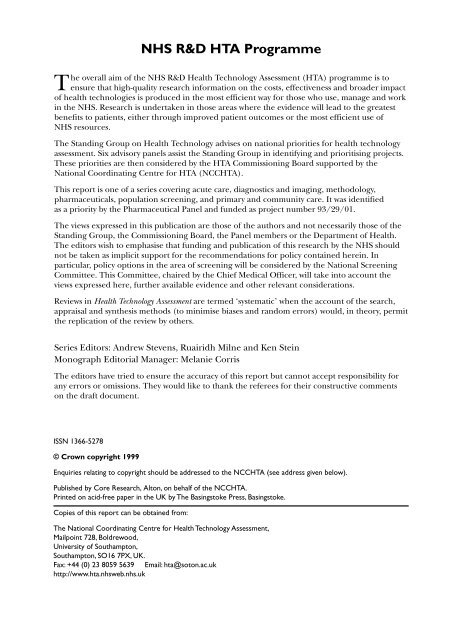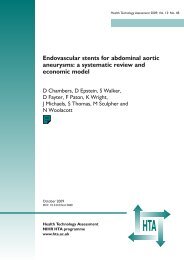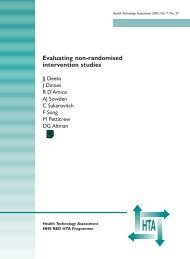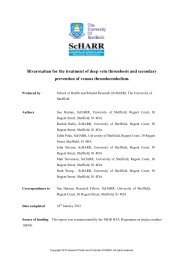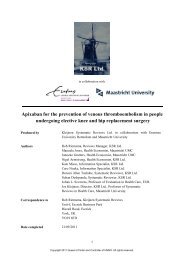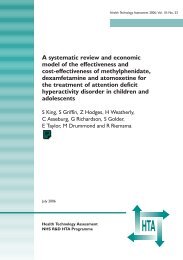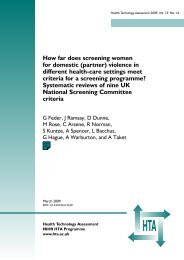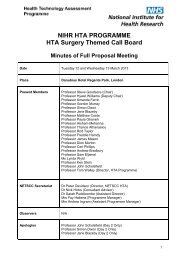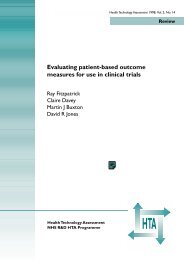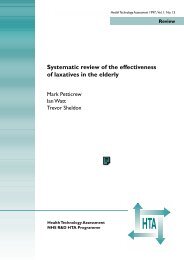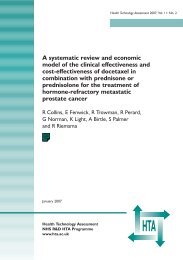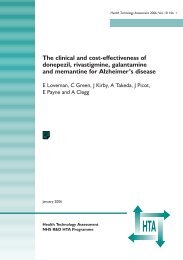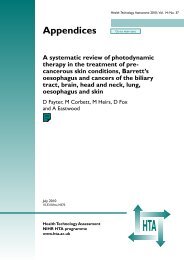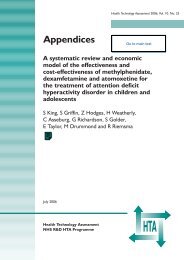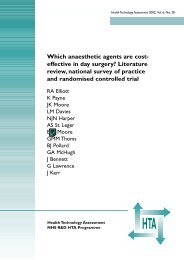Dressings and Topical Agents for Chronic Wounds - NIHR Health ...
Dressings and Topical Agents for Chronic Wounds - NIHR Health ...
Dressings and Topical Agents for Chronic Wounds - NIHR Health ...
You also want an ePaper? Increase the reach of your titles
YUMPU automatically turns print PDFs into web optimized ePapers that Google loves.
NHS R&D HTA ProgrammeThe overall aim of the NHS R&D <strong>Health</strong> Technology Assessment (HTA) programme is toensure that high-quality research in<strong>for</strong>mation on the costs, effectiveness <strong>and</strong> broader impactof health technologies is produced in the most efficient way <strong>for</strong> those who use, manage <strong>and</strong> workin the NHS. Research is undertaken in those areas where the evidence will lead to the greatestbenefits to patients, either through improved patient outcomes or the most efficient use ofNHS resources.The St<strong>and</strong>ing Group on <strong>Health</strong> Technology advises on national priorities <strong>for</strong> health technologyassessment. Six advisory panels assist the St<strong>and</strong>ing Group in identifying <strong>and</strong> prioritising projects.These priorities are then considered by the HTA Commissioning Board supported by theNational Coordinating Centre <strong>for</strong> HTA (NCCHTA).This report is one of a series covering acute care, diagnostics <strong>and</strong> imaging, methodology,pharmaceuticals, population screening, <strong>and</strong> primary <strong>and</strong> community care. It was identifiedas a priority by the Pharmaceutical Panel <strong>and</strong> funded as project number 93/29/01.The views expressed in this publication are those of the authors <strong>and</strong> not necessarily those of theSt<strong>and</strong>ing Group, the Commissioning Board, the Panel members or the Department of <strong>Health</strong>.The editors wish to emphasise that funding <strong>and</strong> publication of this research by the NHS shouldnot be taken as implicit support <strong>for</strong> the recommendations <strong>for</strong> policy contained herein. Inparticular, policy options in the area of screening will be considered by the National ScreeningCommittee. This Committee, chaired by the Chief Medical Officer, will take into account theviews expressed here, further available evidence <strong>and</strong> other relevant considerations.Reviews in <strong>Health</strong> Technology Assessment are termed ‘systematic’ when the account of the search,appraisal <strong>and</strong> synthesis methods (to minimise biases <strong>and</strong> r<strong>and</strong>om errors) would, in theory, permitthe replication of the review by others.Series Editors: Andrew Stevens, Ruairidh Milne <strong>and</strong> Ken SteinMonograph Editorial Manager: Melanie CorrisThe editors have tried to ensure the accuracy of this report but cannot accept responsibility <strong>for</strong>any errors or omissions. They would like to thank the referees <strong>for</strong> their constructive commentson the draft document.ISSN 1366-5278© Crown copyright 1999Enquiries relating to copyright should be addressed to the NCCHTA (see address given below).Published by Core Research, Alton, on behalf of the NCCHTA.Printed on acid-free paper in the UK by The Basingstoke Press, Basingstoke.Copies of this report can be obtained from:The National Coordinating Centre <strong>for</strong> <strong>Health</strong> Technology Assessment,Mailpoint 728, Boldrewood,University of Southampton,Southampton, SO16 7PX, UK.Fax: +44 (0) 23 8059 5639 Email: hta@soton.ac.ukhttp://www.hta.nhsweb.nhs.uk


